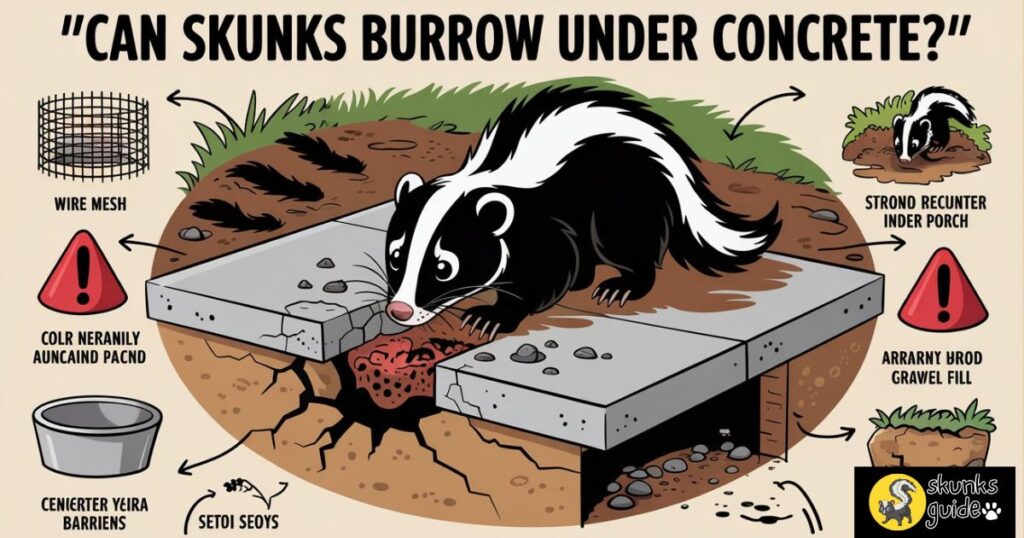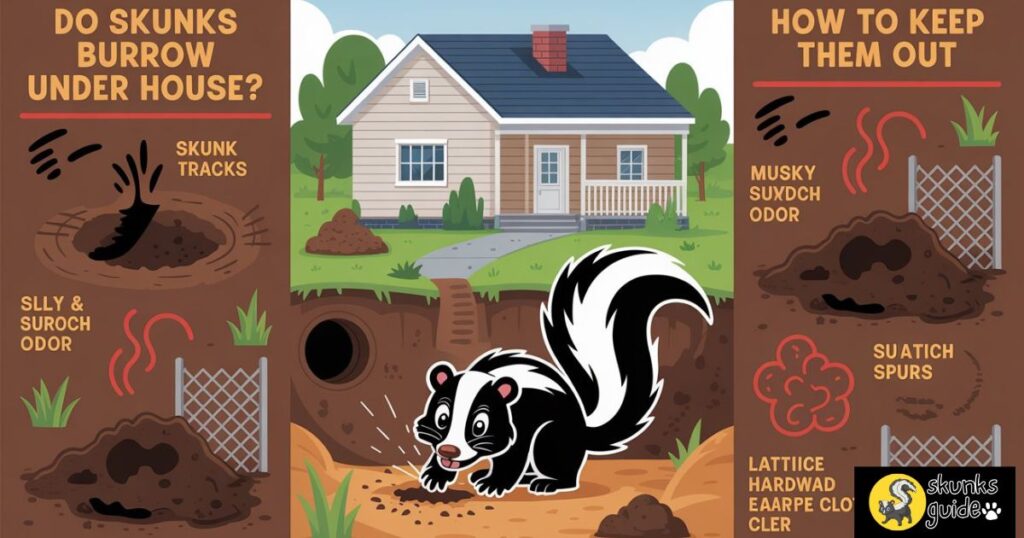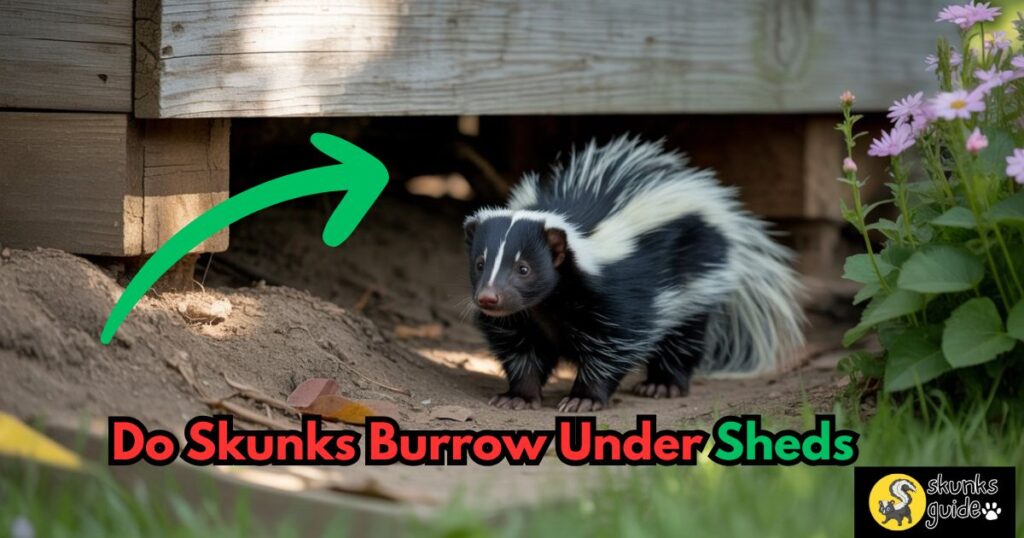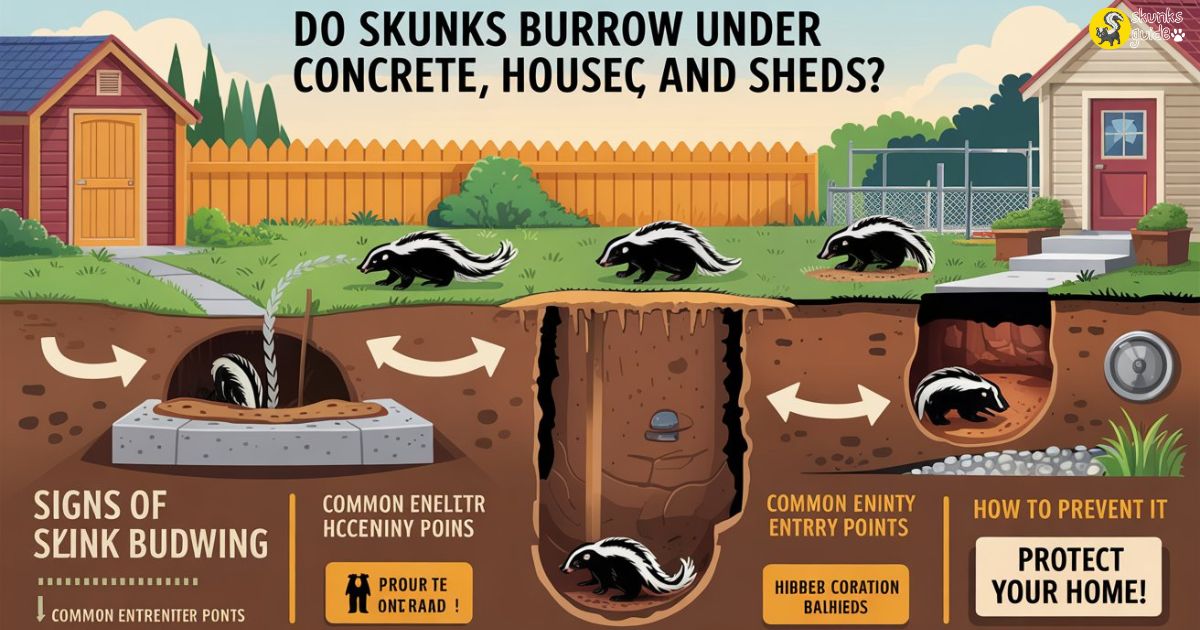Do Skunks Burrow Under Concrete, Houses, and Sheds?
Have you noticed small holes near your patio? Heard scratching under your shed? Smelled something… unmistakable? If so, a skunk might have made itself at home on your property.
Skunks are infamous for their smell, but their digging habits can be just as troublesome. So, do skunks really burrow under concrete, houses, and sheds? The answer is Yes, skunks can and do burrow under concrete, houses, and sheds—especially if they’re searching for food or a cozy shelter.
As a wildlife researcher who’s spent years studying skunk behavior in urban environments, I can confirm: skunks are resourceful and surprisingly determined when it comes to food and shelter. While they’re not master diggers like moles or gophers, they’re more than capable of exploiting weaknesses around your home.
This guide will help you understand where skunks dig, why they choose those spots, and what you can do to humanely prevent and remove them.
Can Skunks Burrow Under Concrete?

Yes, skunks will dig near and even under concrete slabs, especially patios, sidewalks, and driveways. They’re not advanced diggers like groundhogs, but they’re determined and strong enough to create shallow tunnels.
Skunks dig near concrete for two main reasons: food and shelter. Grubs and insects often live just below the surface, and the edges of slabs offer protected, shaded space. Over time, these shallow feeding holes may develop into dens.
Signs to Watch For:
That telltale musky skunk odor.
Cone-shaped holes 3-4 inches wide near concrete edges.
Loose dirt or droppings.
Do Skunks Burrow Under Houses?

If your home has a crawl space or a raised foundation, it’s a prime target for skunks looking for shelter. These areas are dark, quiet, and protected from predators and weather—perfect for a skunk to settle in, especially during colder months or when raising young.
Skunks have powerful legs and claws that let them dig up to two feet deep to reach crawl spaces. Once inside, they may remain undetected for a while. However, the signs become apparent: musky odors seeping into your home, scratching sounds at night, and occasional sightings near vents or access points.
Burrowing under homes carries extra risks. Skunks may damage insulation or wiring, and their odor can be difficult to remove if they spray in an enclosed space. If you suspect a skunk is under your home, avoid trying to block the entrance before confirming it has left—especially during nesting season.
Do Skunks Burrow Under Sheds?

Yes, sheds and detached outbuildings are some of the most common places skunks choose to burrow. These structures are often quiet and undisturbed, with shaded areas that offer ideal nesting conditions.
Entry holes under sheds tend to be about three to five inches wide. Skunks may dig near the base, particularly if the shed has a loose or raised foundation. From April through September, a skunk burrow under a shed may be home to a mother and her kits.
Prevention Tips:
Regularly inspect for signs of entry or damage.
Install galvanized hardware cloth at the base.
Use gravel or concrete footing to discourage digging.
How to Identify Skunk Burrows
To confirm whether a skunk is responsible, look for several key indicators. The entrance to a skunk burrow is typically 3 to 5 inches wide, and you’ll often find displaced soil or loose dirt nearby. The hole may be partially hidden by leaves, mulch, or weeds.
Smell is one of the most obvious giveaways. The musky odor of skunk spray tends to linger, especially around entrances or near crawl spaces. You might also hear rustling or digging noises at night when skunks are most active.
Skunk droppings resemble those of a small dog and may contain insect parts, especially if the skunk has been feeding on grubs or beetles in your lawn.
How to Prevent Skunks from Burrowing
Skunks dig because they’re looking for food and shelter. Remove these attractants, and you make your yard far less appealing.
Start by securing garbage bins with locking lids, and avoid leaving pet food outside overnight. Birdseed and fallen fruit can also draw skunks, so it’s wise to clean up your yard regularly.
To block access to sheds or decks, install galvanized hardware cloth along the base and bury it at least 12 inches deep to prevent digging. Check for gaps in your home’s foundation or crawl space vents and seal them tightly.
You can also deter skunks with motion-activated sprinklers or solar-powered lights. These devices startle intruders without harming them. Some homeowners use scent deterrents like predator urine (fox or coyote) to mimic a natural threat. Human urine is sometimes mentioned online, but it’s not recommended—it’s short-lived and unsanitary.
When to Call a Professional
In some cases, skunk removal should be left to licensed wildlife control professionals. This is especially important if:
- A skunk is nesting under your home or shed with babies.
- The burrow is under a structural foundation.
- You or your pets have been sprayed.
- You’re unsure how to safely remove or deter the animal.
Professionals can install one-way doors, assess the structure, and safely relocate skunks according to local regulations. DIY traps are not recommended unless you’re experienced and your local laws allow them.
Frequently Asked Questions
Usually 1 to 2 feet, depending on soil type and the location’s safety.
Spring and fall are the busiest times, particularly for females preparing dens for their young.
No, but they can dig around and under it where the soil is exposed.
Final Thoughts
Whether it’s under a concrete patio, beneath your home, or tucked away under your shed, skunks will take advantage of any quiet, hidden spot that offers food and shelter. While their digging isn’t usually aggressive, the smell, noise, and structural risks they bring can be disruptive.
By identifying the signs early and taking steps to secure your property, you can keep skunks from turning your home into their own. If the situation is beyond your control—or if babies are involved—don’t hesitate to bring in a professional.
A little prevention now can save you from a bigger, smellier problem down the road.

